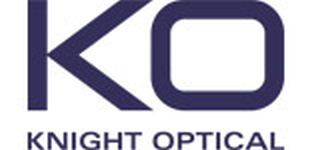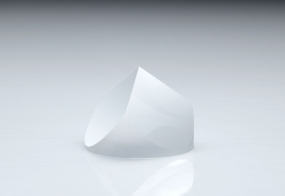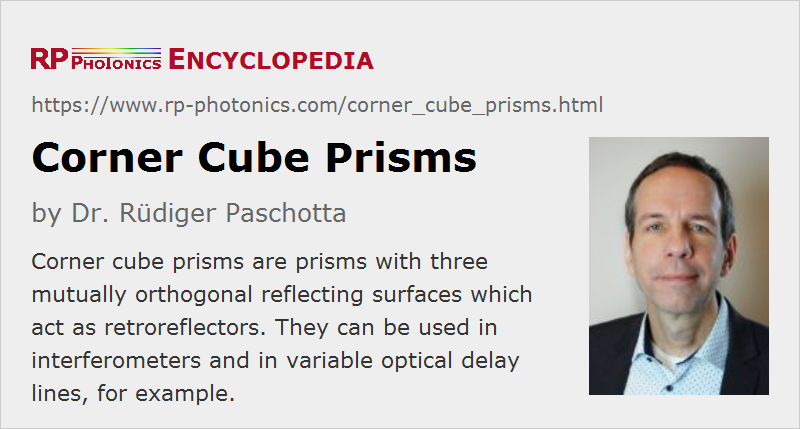Corner Cube Prisms
Definition: prisms with three reflecting surfaces which act as retroreflectors
Alternative terms: corner cubes, retroreflecting prisms, trihedral prisms
More general term: prisms
German: Tripelprismen
Author: Dr. Rüdiger Paschotta
Cite the article using its DOI: https://doi.org/10.61835/fjn
Get citation code: Endnote (RIS) BibTex plain textHTML
Corner cube prisms are prisms which act as corner reflectors, a type of retroreflectors. The basic operation principle is that there are internal reflections on three mutually orthogonal prism surfaces, leading to a direction of a reflected beam which is nominally parallel to the direction of the incident beam – with the accuracy limited only by the accuracy of the surface orientation of the prism. Precision prisms can offer excellent parallelism of incoming and reflecting beams. It is usually specified as an angular deviation, e.g. < 2 arcseconds.
The operation principle is illustrated in Figure 1 for a device which works only in one plane and involves two reflections. A tilt of the prism around one axis can still modify the direction of the reflected beam. Only by using three such reflections, that can be avoided.

Typically, one utilizes total internal reflection on the mentioned three surfaces, or alternatively reflections on metalized surfaces.
Of course, the retroreflection works properly with a laser beam only when it fully hits one of the reflecting surfaces; it should not be directed into the corner.
Despite the name containing the term “cube”, corner cube prisms are generally not having the geometric form of a cube. Instead, the input/output side is oriented roughly perpendicular to the direction of incoming beams, and opposite to it there is the “corner” formed by three mutually perpendicular surfaces. The exact orientation of the input/output surface is not critical, but it is easier to have an effective anti-reflection coating when the incidence is roughly perpendicular. Usually, the input/output surface is equipped with a broadband AR coating. Imperfect operation of the coating leads to a parasitic reflected beam.
Corner cube prisms may be supplied as bare prisms, or together with holds for mounting e.g. to a surface. They are often used in the context of optical metrology, e.g. in interferometers, and in spectroscopy.
More to Learn
Encyclopedia articles:
Suppliers
The RP Photonics Buyer's Guide contains 17 suppliers for corner cube prisms. Among them:


Knight Optical
Knight Optical offer precision N-BK7 corner cube prisms with a 3 arcsecond deviation angle. Often used for beam steering, these retroreflector prisms are also available as custom orders including mounted options.


Artifex Engineering
Artifex offers custom corner cube prisms tailored to your requirements, which can be either solid or hollow. Our retroreflectors are available in a range of substrates and coatings and can be mounted on request. Visit our product page for more information. We look forward to your inquiry.


Avantier
A corner cube prism, also known as a retroreflector, a CCR, or a trihedral prism, is an optical prism that sends an incoming beam of light directly towards its point of origin while translating it spatially.


EKSMA OPTICS
EKSMA Optics offers a selection of corner cube prisms for quick delivery. Custom metal or dielectric coatings can be applied on request.


Shanghai Optics
Shanghai Optics Inc. custom corner cube prisms are used for applications in spectroscopy, satellites, or battlefield technology, also in land surveying, laser resonator cavities, electronic distance measurement, and space vessel docking.


Shalom EO
Shalom EO offers corner cube retro-reflector prisms with three perpendicular reflecting surfaces, which reflect the incident beams back 180° toward its source with total internal reflections (TIR) or special reflections as an alternative option. We provide corner cube prisms made from BK7 materials to satisfy your requirements in the fields of surveying and alignment. Coatings are also available, and please visit our product page for more specifications.


Edmund Optics
Edmund Optics offers mounted and unmounted retroreflection prisms in a range coating options. Reflective surfaces are available with reflection coatings including aluminum and silver. Entrance surfaces are available with VIS 0° anti-reflection coatings. Due to their complex shape, mounting a retroflection prism can be difficult. To ease system integration, mounted retroreflection prisms featuring ¼-20 tapped holes are available.
Questions and Comments from Users
Here you can submit questions and comments. As far as they get accepted by the author, they will appear above this paragraph together with the author’s answer. The author will decide on acceptance based on certain criteria. Essentially, the issue must be of sufficiently broad interest.
Please do not enter personal data here; we would otherwise delete it soon. (See also our privacy declaration.) If you wish to receive personal feedback or consultancy from the author, please contact him, e.g. via e-mail.
By submitting the information, you give your consent to the potential publication of your inputs on our website according to our rules. (If you later retract your consent, we will delete those inputs.) As your inputs are first reviewed by the author, they may be published with some delay.

 general optics
general optics


Connect and share this with your network:
Follow our specific LinkedIn pages for more insights and updates: